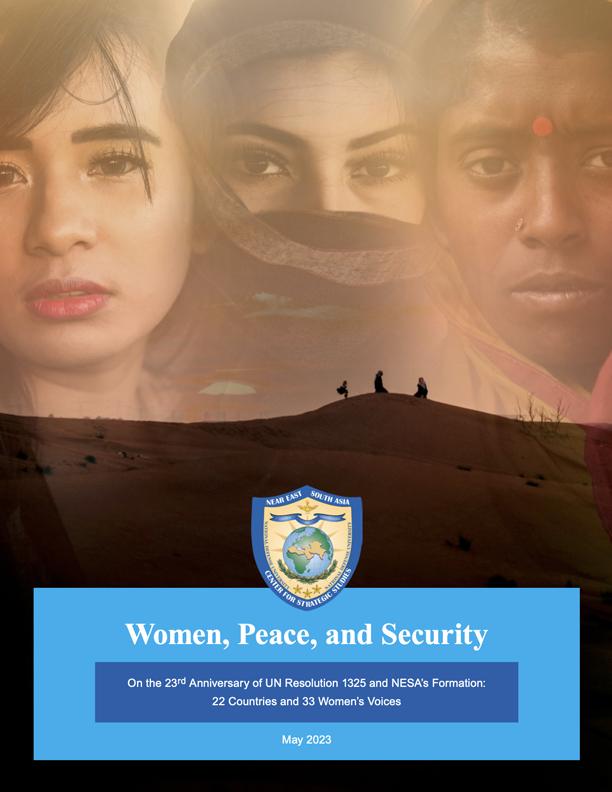2024 Women’s History Month and the NESA Center WPS E-Book
March 22, 2024 2024-03-22 13:312024 Women’s History Month and the NESA Center WPS E-Book
March marks the U.S. Congress’s designation of Women’s History Month to recognize and celebrate the many contributions of women throughout history and today. Just recently, on March 8th, International Women’s Day was celebrated. Both events recognize the contribution of women and carried with them calls for action.
Against this backdrop is the 24th Anniversary of the adoption of UNSCR 1325 (2000) on Women, Peace, and Security. In itself, a ground-breaking resolution was spearheaded by women leaders and organizations. It is the first resolution that recognized women’s leadership to achieve international peace and security and their contributions to conflict prevention, peacekeeping, conflict resolution, and peacebuilding. The resolution also acknowledged the disproportionate and unique impact of armed conflict on women and girls. It called for the adoption of a gender perspective to consider the special needs of women and girls during conflict, repatriation and resettlement, rehabilitation, reintegration, and post-conflict reconstruction.
More specifically, the resolution reaffirmed the important role that women play in conflict prevention, conflict resolution, and peacebuilding. It emphasized the importance of women’s equal involvement in peace and security and the need for women’s increased participation in conflict prevention and peacebuilding. It reaffirmed the importance of human rights law in the protection of women and their rights while acknowledging the need to adopt a gender perspective in peacekeeping operations and training of peacekeeping personnel. It recognized that the protection of women and girls and their participation in peace processes is important and directly tied to international peace and long-term security.
The United Nations Women and the UN Department of Economic and Social Affairs (UN DESA), highlighted how gender disparities have worsened in the face of “stacked/cascading” global crises – such as the pandemic, violent conflict, and climate change – coupled with the ongoing backlash against women’s sexual and reproductive health and rights over their own bodies. It states that achieving full gender equality, one of the UN’s 17 Sustainable Development Goals (SDGs), could now not take decades, but rather centuries if the current rate of progress continues. The UN Gender Snapshot 2022 report starkly highlighted the unacceptably slow pace of progress. With legal systems that neither ban violence against women, nor protect their rights in marriage and family, it predicts that inequality may continue to exist for generations to come. The report warns that at the current rate of progress, it will take optimistically up to 286 years to close gaps in legal protection and remove discriminatory laws. It will even take as much as 140 years for women to achieve equal representation in leadership positions in the workplace, and 40 years for the same to happen in national parliaments.
In the meantime, malign actors have been strident in their not-so-subtle and too often ignored efforts to remove references to women’s rights and weaken resolve of UN Resolution 1325, as well as undermining other UN initiatives protecting women and their rights.
The Near East South Asia (NESA) Center for Strategic Studies’ philosophy, in keeping with the spirit and intent of WPS, tailors our efforts to the realities of our region in a more holistic, long-term engagement approach in its execution. Our goal is to grow and develop a mature cadre of serious women security experts in the region who can focus on wide-reaching security and peace issues. The NESA Center is proud to celebrate the more than 1,800 women that have participated in our foundational courses, WPS workshops, and collaborative seminars since our founding in 2000. Our incredible alumnae remain active in all areas of military and government, academia, and non-governmental organizations in the countries they represent. The NESA Center promotes the equal and meaningful inclusion of women across its programs and recognizes their critical role in achieving and sustaining international peace and security. However, the NESA Center still has much work to meet the DOD’s established goal of 20% women participants. Since 2000, women still only make up 12.6% of our total Alumni.
Last year, on the 23rd Anniversary of UNSC Resolution 1325 and NESA’s 23rd Anniversary of its establishment, the NESA Center had a series of firsts in its WPS efforts. In April 2023, the NESA Center conducted its first-ever WPS Security Workshop focused on the “Changing Nature of Security” and “Transnational Threats.” There were 53 women from 24 countries from Latin America, Africa, the Levant, Central Asia, the Gulf and South Asia in attendance. The venue also allowed for the release of the NESA Center’s first-ever special edition Women, Peace, and Security e-book. The book brought together 33 women’s voices from 22 countries across the NESA region, many of whom also attended the security workshop. Access the e-book here.








